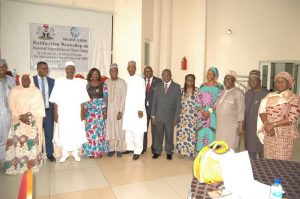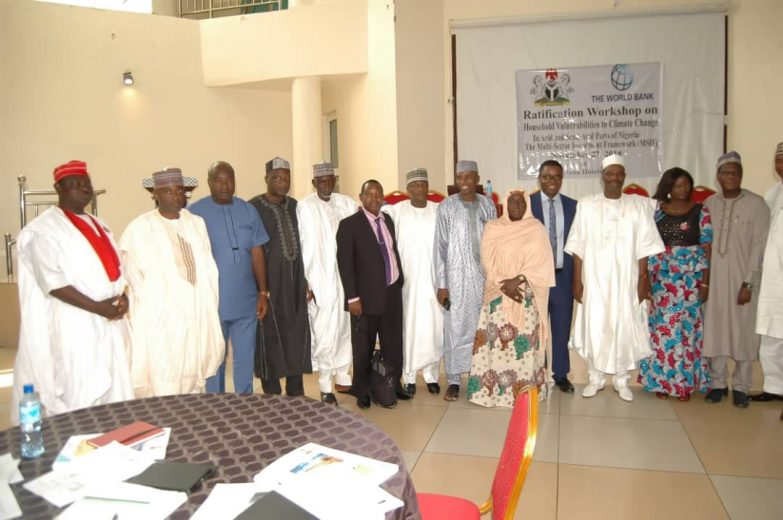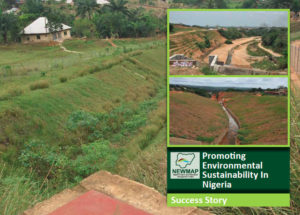The World Bank, in collaboration with the Federal Ministry of Environment, commissioned a study on “Assessment and Analysis of Economic Cost of Land Degradation and Hotspot Mapping” for a range of sectors in the arid and semi-arid areas of Nigeria.
The environment is naturally blessed with dynamic resources that include vegetation, water, soil and animals. However the naturality of the plush vegetation, aquatic lives gets degraded, polluted and depleted courtesy of natural, Climate and human activities.
Whilst land deterioration and degradation is on the increase across sub-Saharan Africa, managing these trend becomes very imperative for responsible government, especially African governments; this occasioned the collaboration of the Federal Government of Nigeria and the World Bank to commissioned a research into determinants of land degradation and sustainable land management in the six states of northern Nigeria (Borno & Sokoto in the semi-Arid Zone, Adamawa & Kano in the Sub Humid Zone, and Niger and Kogi in the Humid Zone.
The study on the determinants of land degradation and sustainable land management in the six states covered five major categories of environmental components namely: agricultural land, forest, water, air quality and waste.
The workshop which take place on 28th November, 2018 in Abuja, aimed at validating the report of the studies conducted for Assessment and Analysis of the Economic Cost of Land Degradation and Hotspots Mapping in Arid and Semi-Arid Regions of Nigeria.
According to Dr Amos Abu, Senior Environmental Specialist –Gender, World Bank Nigeria Country Office and Task Team Leader, Nigeria Erosion and Watershed Management Project “It is a joint World Bank and Federal Government effort and we are into it because it is one of the priority areas that have been identified by the government and, as a good partner, we are working with them to having clarity as it pertains to the cost of environmental degradation in Nigeria. This will help inform policies, it will also help in better targeting and also prioritization and sequencing.
‘He summed that land degradation assessment “is one of the primary consideration in a decision support system for reversing degrading land. He noted that this was what led to the conception of Nigeria Erosion and watershed Management Project (NEWMAP) which he described as “a flagship project doing a lot to strengthen the foundation of ecological knowledge that may stimulate putting sustainable land use as well as emission reduction into practice in Nigeria.”
“This is really study diagnostics that will help inform policy in a very practical and poignant manner, and thus we also see that it will help in sequencing, and also give a sense of priority and then gross our attention to what will happen in a do-nothing scenario. So, this is a decision support tool that this new study has thrown up and we are going to take it further.”
Mahmoud Bello Abubakar, who produced the Assessment and Analysis of Economic Cost of Land Degradation and Hotspot Mapping in Arid and Semi-Arid Region in Nigeria”, report disclosed that the study assessed and analyzed the extent of land degradation hotspot, drives (causes) and its economic cost.
“It also analyzed the determinants of land degradation and sustainable land management in the six states of northern Nigeria (Borno and Sokoto in the Semi-Arid Zone, Adamawa and Kano in the Sub-Humid Zone, and Niger and Kogi in the Humid Zone),”
The workshop which lasted for 2 days witnessed on 27th November, 2018, the validation of reports on “Household Vulnerability to Climate Change in Arid and Semi-Arid Northern Nigeria as well as “Multi- Sector Investment Framework (MSIF) for Climate Resilience in Nigeria” which were prepared by Prof. Olukayode Oladipo.
The goal of the “Household Vulnerability to Climate Change in Arid and Semi-Arid Northern Nigeria” report, according to the presenter, Prof. Oladipo, is to carry out vulnerability mapping to underpin development of a pragmatic framework for climate resilient development activities in the agriculture and forest sectors, taking into consideration activities in water resources, irrigation and energy to ensure an integrated approach to building landscape resilience.
The “Multi-Sector Investment Framework (MSIF) for Climate Resilience in Nigeria”, he added, stresses that massive investment is required to build the country’s resilience to climate risks and to safeguard its natural capital in the light of increasing climatic variability that is expected to affect the area. According to him the occasion was “an information-gathering and data-generating system to enable the World Bank to look at the potential areas of investment that the World Bank can support and bring about positive development in the concerned areas or regions.”



